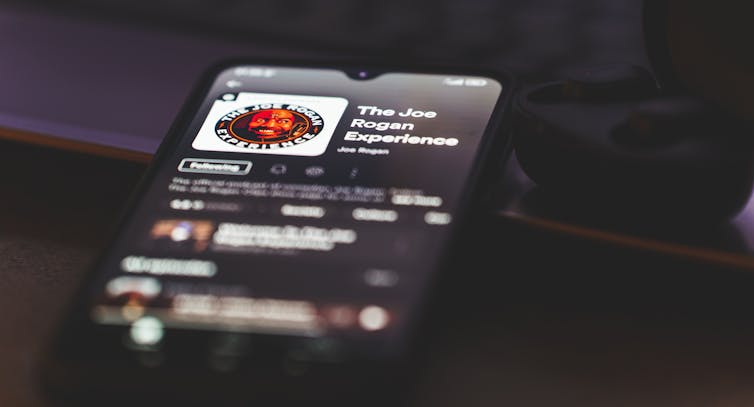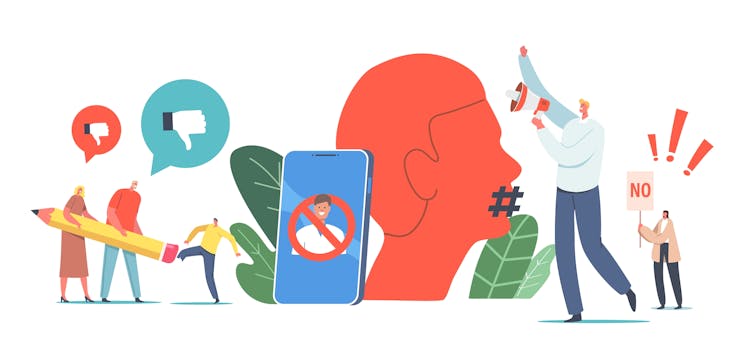
Lara Millman, Dalhousie University
Joe Rogan recently apologized for his repeated use of “the N-word” on his popular podcast after a video documenting his use of the racial slur was widely shared online.
This is not the first time Rogan has been under fire for problematic podcast clips resurfacing. He called his behaviour “regretful and shameful,” insisting he now realizes “it is not [his] word to use,” and says “I never used [this slur] to be racist, because I’m not racist.”
Comments like this reignite discussions on cancel culture: should we deplatform influential personalities when they behave like this?
Cancel culture, in its most abstract form, is harsh. If we are going to cut people out of their influential roles for making mistakes and misunderstanding things about the world, go ahead and cancel us all.
We often hear privileged voices bemoaning the fact that “you can’t say anything anymore,” or “it seems wrong that one mistake can end a person’s career.”
This line of argument insists it doesn’t make sense to cancel someone — but this approach misses an important aspect of cancel culture as it stands today. Cancel culture is not just an abstract strategy, it is a way for marginalized communities to reduce harm.
While many might think this attitude is rooted in over-sensitivity, consideration of the relevant history and embedded oppression offers us insight into why some seem eager to cancel.
Shaping social discourse
I study the social dynamics of belief and the structural influences on how we access accurate information. One of the most salient features of our collective knowledge is that it is largely produced by the ultra-privileged.
Consider our colonial history of racist exclusion: Black and Indigenous people have been actively kept out of knowledge production. They’ve been kept out of post-secondary institutions and were not afforded the right to participate politically.
Black and Indigenous people were corralled into segregated communities where they lacked access to clean drinking water, nearby healthcare and food access, general safe living conditions, among other things. These factors all work together to effectively prohibit these people from shaping social discourse.

A tool of the oppressed
It isn’t hard to see that there is a point at which the continual onus of educating the privileged (and the ignorant) becomes too heavy a burden to bear.
When the emotional and educational labour is falling disproportionately on those already oppressed by current systems, there is little choice but to cancel away.
Why do so many people see cancel culture as “woke sensitivity” rather than a tool of the oppressed? This is partially due to the social dynamics of how we acquire knowledge.
Our social positions paired with accepted practices of knowledge production, contribute to ignorance where it is challenging to see and accept cancel culture as a phenomenon rooted in a history of racist treatment.
At this particular point in time, we live in a society stratified by race, sexual orientation, gender, class, etc., and this means privilege can prevent us (privileged folks) from seeing the associated harms.
Since people of colour have historically been excluded from political and social discourse, mainstream theories largely erase their experiences. This erasure entrenches a perception of our social structures as homogenous and harmonious, leading to privileged people identifying instances of injustice as anomalies, when this is not the case.
The norm
Racism has long been the norm in North America. Correcting this misunderstanding must involve prioritizing the voices in marginalized communities. Marginalized people are better situated to accurately see how contemporary social systems are problematic.
This context can help us to see that cancel culture interpreted (by privileged folks) as unwarranted sensitivity is a gross misrepresentation.
But cancel culture can be used in nefarious ways — it might be a useful tool for harm reduction in some instances, but it is often co-opted to misrepresent information, violently harass and threaten individuals and undermine worthy social causes.
Since social media offers the masses immediate access to the “cancelee,” we must recognize the toll of an onslaught of social media attacks as extremely serious.
I am a firm believer that people can change their views, that people should be free to discuss relevant misunderstandings about social issues (without the risk of cancellation). At the same time, it is a simple fact that privileged folks will often lack perspective.
If cancelling amounts to treating a person as if they are irredeemable, this is problematic. We need better avenues for allowing people to learn and evolve and be better.
In an interview, bell hooks asks a pointed question:
“How do we hold people accountable for wrongdoing yet at the same time remain in touch with their humanity enough to believe in their capacity to be transformed?”
This should be our focus for social improvement. A situated understanding of cancel culture can help us see where our social discourse is falling short.
A diagnosis
We can view cancel culture as a diagnosis. Cancel culture is not a product of “brainless woke youth.” Cancel culture is the result of consistently ignoring oppressed and marginalized voices.
What’s complicated is that the nature of our social structures means privileged people are likely not in a good position to recognize these harms, let alone pronounce “we stand with Joe Rogan.”
We must prioritize marginalized voices to more accurately understand the world in which we live, while receiving this information appropriately to (socially and politically) improve the conditions of those in marginalized communities.
We must hold influential people accountable for their problematic behaviour and minimize the potential harm incurred by oppressed individuals as we attempt to educate responsibly.
Privileged people don’t get to unilaterally decide that their behaviour isn’t racist. Real change must involve more humility (I’m looking at you, Joe).![]()
Lara Millman, PhD Student, Philosophy, Dalhousie University
This article is republished from The Conversation under a Creative Commons license. Read the original article.

